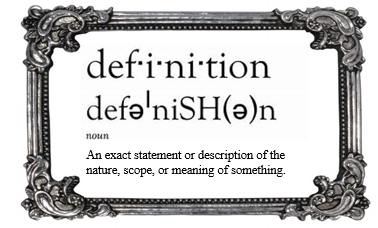Nearly all project management courses have a slide early on titled “What is a project?” and then proceed to show one of the many different project definitions. Which one usually depends upon what flavour of project management the course adheres to. The same is true of courses in programme management.
Every new guide or new version of a guide tries to improve on what has gone before. I have even seen social media conversations devoted to refining and improving the definitions of projects or programmes.
To me, this is an utter waste of time. Why? Because projects and programmes can’t be defined and to attempt to do so puts those who are new to the discipline in the wrong mind-set right from the start.
To explain why, we should first look at what a definition is. If it doesn’t sound too introspective, let’s define ‘definition’.
The Oxford English Dictionary (OED) defines a definition in this context as:
“An exact statement or description of the nature, scope, or meaning of something.”
The killer word in this sentence is ‘exact’. Can we really define projects or programmes ‘exactly’? I would argue “most definitely not” for reasons explained in my blog “Projects, programmes, portfolios and the discontinuous mind”.
Despite this, renowned experts and authors constantly seek the Holy Grail of the perfect definition.
Let’s briefly have a look at a few. The PMBoK Guide® from the PMI® defines a project as:
"A temporary endeavour undertaken to create a unique product, service or result"
Seems to me that works just as well for a programme as it does for a project.
The APM BoK defines a project as:
“A unique, transient endeavour undertaken to achieve planned objectives”
Once again, how is that a project and not a programme? Let’s not forget that one of the key implicit purposes of these definitions is to define not only what a project is but what it isn’t. That’s why it needs to be ‘exact’.
OK. If we want to understand the difference between projects and programmes let’s have a look at the programme definitions. The PMBoK Guide® defines a programme as:
"A group of related projects, sub-programmes and programme activities that are managed in a co-ordinated way to obtain benefits that are not available from managing them individually"
The first thing we need to do is ignore the bit about ‘sub-programmes and programme activities’ because that is self-referential. The key word here is ‘benefits’. This, and other definitions, are often interpreted as meaning that programmes deliver benefits but projects do not. This is incorrect in practice because many ‘projects’ do deliver benefits that are not complex enough to require a full programme organisation.
The APM definition also promotes this view:
“A group of related projects and change management activities that together achieve beneficial change for an organisation.”
This implies that you can only call something a programme if it is about organisational change.
Interestingly, the Axelos guides (PRINCE2 for projects and Managing Successful Programmes for, obviously, programmes) take a different approach.
A project is: "A temporary organisation that is created for the purpose of delivering one or more business products according to an agreed business case"
A programme is: “A temporary flexible organisation structure created to coordinate, direct and oversee the implementation of a set of related projects and activities in order to deliver outcomes and benefits related to an organisation’s strategic objectives. A programme is likely to have a life that spans several years.”
So, should we be defining a thing or the organisation that manages it? It’s all too confusing, and I haven’t even got onto the subject of portfolios yet!
This is a blog, not an academic article so let’s cut to the chase. By ‘defining’ separate, mutually exclusive entities of project, programme or portfolio, we encourage people to think everything has to fit into one of three boxes. That simply isn’t true, and history tells us we can’t do it anyway. It’s one of the many ways that current thinking nudges people into the wrong mind-set.
To round things off, let’s first have a look at how the OED defines ‘describe’:
“Give a detailed account in words of”
By describing rather than defining projects, programmes and portfolios we would have a lot more flexibility in explaining what they are. Descriptions can include phrases like:
‘Projects are typically about delivering outputs rather than benefits but can also deliver benefits in non-complex situations’; ‘Programmes are often focused on delivering organisational change and the benefits that arise from that.’
Is there a level at which a definition actually works? The OED defines a project as:
“An individual or collaborative enterprise that is carefully planned to achieve a particular aim.”
For me, that definition of ‘project’ works pretty well for projects, programmes and portfolios (I know the agilists will initially react against the ‘carefully planned’ bit, but backlogs and sprints also need careful planning to make them work - just think MoSCoW). It’s also interesting to note that the OED definitions of programme and portfolio bear little or no relation to the ones we are used to in our profession – making them classic examples of jargon.
So, if we have to have a definition, how about a collective one:
“Projects, programmes and portfolios are collaborative initiatives that are carefully planned to achieve a unique aim.”
Explaining the distinctions between projects, programmes and portfolios and all the grey areas around them, is then about description not definition.





